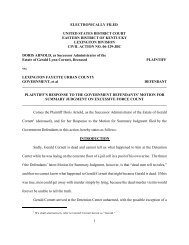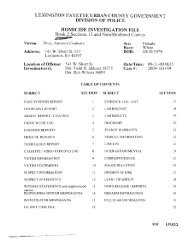PRESCRIPTION FOR PAINLEXINGTON HERALD-LEADERA LACK OF INTEGRITY, MONEY <strong>AND</strong> UNITY LIMITS INVESTIGATION OF DRUG OPERATIONS◆H<strong>AND</strong>CUFFING ENFORCEMENTShortages of cash,manpowerplague policeOriginally published Jan. 29, 2003By Bill Estep and Tom LasseterHERALD-LEADER STAFF WRITERSMCKEE — When police in JacksonCounty investigated two people last Auguston suspicion of selling drugs, Sheriff Tim Feesaid he forked over $80 of his own money soan informant could buy two OxyContin pills.That helps explain why there’s not moredrug enforcement in rural <strong>Kentucky</strong>. Manysheriffs’ offices don’t have the money or manpowerto do much of it.The <strong>Kentucky</strong> State Police has only twodozen officers specifically assigned to druginvestigations for 56 Eastern and Southern<strong>Kentucky</strong> counties.“It’s really, really slim,” said state policeMaj. Mike Sapp. “To properly enforce thedrug problem, we would need to at leasttriple the amount of people.”Instead, the agency is 64 officers short ofits budgeted strength.Meanwhile, the FBI has been consumedwith <strong>com</strong>bating terrorism, which shifts attentionand staff away from drugs, and the U.S.Drug Enforcement Administration focuses onlarge drug organizations, not street-level dealers.The bottom line: The size of the drugproblem exceeds the troops to fight it.Though the numbers fluctuate, <strong>Kentucky</strong>has ranked near the bottom in the nation in thenumber of sworn police officers per capita, accordingto the U.S. Bureau of Justice Statistics.In 1997, only two states had a lower rateof police officers in state and local departments.<strong>Kentucky</strong> had 15.5 officers per 10,000residents, ranking ahead of only Vermont andWest Virginia.By 1999, the most recent year for such data,the figure was 17.6 officers per 10,000 residents,which ranked <strong>Kentucky</strong> ahead of 10other states.Heavy workload for sheriffsSheriffs wear a lot of hats in <strong>Kentucky</strong>.They’re responsible for collecting taxes, transportingprisoners, providing court securityand serving court papers, such as summonses.Combine that with meager funding andbig areas to cover, and few are able to dodrug investigations that require extended surveillanceor expensive drug purchases.“The sheriffs are very limited in whatthey can do,” said former Letcher CountySheriff Steve Banks, who left office thismonth. Banks said he had five full-time andtwo part-time deputies to cover a county ofmore than 25,000.Jackson County’s Fee said he wants drugsoff the street, but money for investigators’drug buys often <strong>com</strong>es out of his pocket. “Aman suffers from financial pneumonia” doingthat, he said.In Lee County, which covers 210 squaremiles, Sheriff Harvey Pelfrey said he and hislone deputy rely on volunteer special deputiesfor help. “It keeps me busy just doing … paperworkand transports,” Pelfrey said.The state police are “strapped like everyoneelse,” said Col. Rodney Brewer. Whilethe state has authorized 1,020 officers, theagency has only 956. Brewer said 11 of thoseofficers have been called to military duty.The state police made a number of moveslast year to beef up drug enforcement, suchas setting up a system to better share informationamong officers. At each regional post,a detective was assigned to be a street-leveldrug investigator. The agency also expandededucation efforts against drug abuse.The changes came as a report by the statepolice and the National Drug IntelligenceCenter was making clear that <strong>Kentucky</strong>’sdrug problem “has exceeded the resources oflaw enforcement officials.”“Abuse of certain types of drugs is so pervasivethat effective law enforcement and preventionefforts prove extremely difficult,”said the report, released in July.FBI focuses on terrorismThe FBI has long played a key role in <strong>Kentucky</strong>drug investigations, especially cases involvingpolice corruption related to drugs. Theagency investigated the largest such case instate history, charging four Eastern <strong>Kentucky</strong>sheriffs, a deputy and a police chief in 1990with taking payoffs to protect drug runners.Because it can severely damage the qualityof life in <strong>com</strong>munities, public corruptionremains a top priority for the FBI, said J.Stephen Tidwell, special agent in charge ofthe FBI in <strong>Kentucky</strong>.Since Sept. 11, 2001, however, the FBIhas shifted resources to deal with terroristthreats. The agency has fewer agents in Eastern<strong>Kentucky</strong> now than before the attacks, althoughofficials declined to say exactly howmany agents it has in the state.Tidwell said there was a time when theagency could put other matters on the backburner, if necessary, in order to concentrateresources on investigating a large drug organization.“Now we’re not in the position to do thatas much as we’d like to,” Tidwell said.DAVID STEPHENSON | STAFFIn October, Clay County sheriff’s deputies Rick Wagers, left, Paul Whitehead and James Sizemore charged James Roberts with use or possession of drugparaphernalia. Roberts pleaded guilty and was fined $25, plus $130.50 in court costs.FEDERAL MONEY FAILS TO UNITE POLICE AGENCIESOriginally published Jan. 29, 2003By Bill Estep and Tom LasseterHERALD-LEADER STAFF WRITERSLONDON — Over the past five years, Congresshas approved $30 million for a programthat was supposed to meld federal, state and localpolice into one cooperative force to attackdrugs in Southeastern <strong>Kentucky</strong> and parts ofeast Tennessee and West Virginia.That hasn’t happened.■ Turf fights have sometimes gotten in theway, as one police agency avoided sharing informationwith another.■ The history of bribery and corruptionamong local lawmen has made state and federalpolice reluctant to share confidential informationwith local cops.“That is just not possible in some Eastern<strong>Kentucky</strong> counties, because of corruption,” saidDave Gilbert, a former deputy director of theprogram.■ Though money flowing through the AppalachiaHigh Intensity Drug Trafficking Areaprogram, called HIDTA, has paid for some expensiveequipment, member agencies have attimes used the money for their own work outsidethe target area, a former member of itsboard said.There’s no question the program has boostedthe fight against drugs in the sprawling areait covers.Agencies working under HIDTA haveseized millions of dollars worth of drugs andhundreds of weapons. They’ve cut and burnedmarijuana worth an estimated $5 billion in aneradication program one federal official called“second to none in the country.” And HIDTAmembers have arrested more than 6,000 peoplesince the program started in 1998, according toits annual reports.But some local agencies <strong>com</strong>plain they’veseen little of the money. And funding for oneleg of the program — an effort to interrupt theflow of drugs by stopping couriers on the highways— was frozen in 2002 after federal officialssaid it wasn’t working well.Changes aimed at addressing the problemsare under way. But police across Southeast <strong>Kentucky</strong>acknowledge that the illegal drug tradehas grown quickly over the past several years,and their side has some catching up to do.Federal money helpsIn 1998, an area centered on Southeast <strong>Kentucky</strong>became a HIDTA — that is, an area ofhigh-intensity drug trafficking. There are now28 such areas.The region’s enduring status as one of thefive largest marijuana-producing states in thecountry helped it win that designation. Theconsiderable influence of Republican U.S. Rep.Hal Rogers, who represents much of Eastern<strong>Kentucky</strong>, also played a role.Without HIDTA, the federal Drug EnforcementAdministration probably wouldn’t haveseveral agents stationed in Laurel County. TheU.S. Forest Service wouldn’t have extra officersto prowl for pot patches. And the Internal RevenueService and the federal Bureau of Alcohol,Tobacco and Firearms wouldn’t have extraagents in rural <strong>Kentucky</strong> to investigate moneylaundering and gun crimes related to drugs.HIDTA’s headquarters in London includesan intelligence center to help police. The programalso brings money for increased prosecutionin state and federal courts.But the core of the HIDTAconcept —bringing federal, state and local police togetherto share information and target drug traffickers— hasn’t <strong>com</strong>e to pass.For example, one goal of the program iscalled “co-location” — getting police from eachagency moved into the same office to share information.Though HIDTArents office space inJoining forcesThe Appalachia HIDTA was designated in 1998 totarget marijuana in 65 counties, primarily in Southeast<strong>Kentucky</strong>, East Tennessee and West Virginia. Ithas since expanded to 68 counties, shown below,and switched its focus because of growing problemswith drugs such as prescription narcotics andmethamphetamine.REPORT DRUG TRAFFICKINGThe Appalachia High Intensity Drug Trafficking AreaTask Force has a tip line where people can reportsuspected drug activity. The toll-free number is866-424-4382. Reports can be madeconfidentially.Tennessee<strong>Kentucky</strong>WestVirginiaCountiescoveredby HIDTAdowntown London for $150,000 a year, not allthe participating agencies keep officers there.Member agencies say it has been difficult to getall the agencies together, in part because of alack of space, and because they cover such alarge rural area.The program has been a financial boon forparticipating agencies, which include the FBIand DEA, several state-level police agenciesand the National Guard.For the last fiscal year, state-level policeagencies requested more than $750,000 fromHIDTA to pay officers overtime.Agencies have also put in for hundreds ofthousands of dollars to lease vehicles and buyhigh-tech surveillance and <strong>com</strong>municationsequipment. The West Virginia Public SafetyCommission, for instance, asked for seven mobile<strong>com</strong>munication systems at $7,728 each. The<strong>Kentucky</strong> State Police sought two $3,000 nightvisionmonoculars. And the U.S. Forest Servicerequested cameras that cost $7,300 each.HIDTA Director Roy Sturgill said mostsuch budget requests have been honored.But local police departments say little moneyhas trickled down to them. Harlan CountySheriff Steve Duff said his office got about$5,000 in overtime funding over the past threeyears through HIDTA.“Where they’re lacking with locals is they’renot giving us enough funding,” Duff said.Col. Steve Lundy of the Corbin police saidHIDTA once offered the department $4,000.That would have paid an officer to work only afew hours a week to investigate drug couriers,he said.“It’s too limited to do anything with drugtraffic,” Lundy said.Some police said they hadn’t seen much ofan effort to bring local police into investigations.“We expected more of a cooperative typething,” said Todd Roberts, assistant police chiefin Manchester.Glen Thomas, who recently retired as a lawenforcementsupervisor for the U.S. Forest Serviceand was on the HIDTA executive board,said the board urged local police to apply forfunding by submitting specific plans, but gotlittle response.Misdirection of fundsThe Appalachia HIDTA faced the first <strong>com</strong>prehensivereview by its parent agency lastsummer. The federal Office of National DrugControl Policy declined to release findings fromthe review, saying the document wasn’t final.But several people who saw results of the reviewsaid it raised questions about whetherparticipating agencies were using the programto boost their budgets and continue their ownwork, rather than <strong>com</strong>ing together to multiplyeffectiveness.The review noted concerns that investigativeagencies weren’t sharing information.Some agencies had used HIDTA-fundedequipment, such as cameras, drug-sniffing dogsand vehicles, for work outside the target counties,said Thomas, the former Forest Service supervisor.Agencies participating in the “interdiction”initiative aimed at stopping drug couriers werein effect using HIDTA money to fund their ownindividual programs, reviewers noted.Maj. David Herald of the <strong>Kentucky</strong> Divisionof Vehicle Enforcement said there was a shortfallin exactly what the HIDTA program is supposedto promote: cooperation, <strong>com</strong>municationand information sharing.The vehicle enforcement division had participatedin the interdiction program that wascanceled.Herald said investigators from other agenciesdidn’t let his officers know about potentialleads. And when the interdiction cops made anarrest, there was no attempt to follow up andconnect the drug courier to other investigations.“Everybody was basically doing their ownthing, and you’re not going to be successful thatway,” Herald said.Herald and others said the HIDTA concept isgood, but has been undermined at times whenparticipating agencies looked to protect turf.The federal reviewers also said federal andstate agencies needed to work with local officerson task forces, said U.S. Attorney GregoryF. Van Tatenhove.‘It’s done a lot of good’Several current and former HIDTA officialssaid it’s not unusual that there were somebumps in developing such a large program.Some say the Appalachia program didn’t get agreat deal of firm direction from ONDCP in itsearly days.Nonetheless, the good has far outweighedthe bad, they said.“I think it has been a successful program.It’s done a lot of good,” said Gilbert, the formerdeputy director.HIDTA officials are working on changesaimed at making the program more effective.For instance, the DEA, state police and theForest Service have started working on taskforces with local police, or developing suchjoint efforts, in several counties.The program’s executive board has requestedfederal approval to pick up salary and overtimecosts for some local officers to take part intask forces, said Sturgill, the HIDTA director.And though there have been concerns abouttrusting local officers, there are a lot of goodcops throughout the region who can work withfederal and state authorities to bust drug operations,Thomas said.At the direction of its federal overseers, theAppalachia HIDTA board will be putting itsmoney behind the concept of cooperation. Beforeany agency can get funding, it will have tobe part of a formal task force with a defined objective,said Van Tatenhove, who is on theboard.That change is aimed at ensuring that moneygoes to specific anti-drug operations, insteadof just going to agencies.As HIDTA nears the end of its fifth year inbusiness, Van Tatenhove said he is excitedabout its potential.“This is a great resource for our <strong>com</strong>munity,”he said, “particularly a part of our state thatcontinues to struggle with the war on drugs.”
Originally published Jan. 29, 2003By Bill Estep and Tom LasseterHERALD-LEADER STAFF WRITERSIn the late 1980s, two professors <strong>com</strong>pileda list of criminal rings in Eastern <strong>Kentucky</strong>,then hung around game rooms, roadhousesand restaurants, played a little poker and dida lot of listening.The goal was to make contact with peoplein crime rings and find out whether drugdealers, gamblers, prostitutes and others usedbribes or relationships with local public officialsto protect illegal activity.Turns out they did.Gary W. Potter and Larry K. Gaines, thencriminal-justice professors at Eastern <strong>Kentucky</strong>University, reported that of 28 criminal organizationsthey studied in five counties, 25 benefitedfrom some corrupt or <strong>com</strong>promising relationwith government and law-enforcement officials.The study reported payoffs; family ties betweenpeople paid to enforce the law and peoplebreaking it; and cases of “official acquiescence,”or cops looking the other way.“It is inconceivable that in these rural counties,illicit gambling, prostitution, alcohol anddrugs could be delivered on a regular and continualbasis without the knowledge of governmentofficials, law enforcers and ‘legitimate’ businessmenin the <strong>com</strong>munity,” said the study, publishedin February 1992 in the Journal of ContemporaryCriminal Justice, an academic journal.Potter and Gaines used news accounts toidentify criminal organizations. They later interviewed16 people involved in the rings,promising them anonymity.The professors did not identify the fivecounties in the study.Not much had changed by the late ’90s, accordingto a 1999 report from the AppalachiaHigh Intensity Drug Trafficking Area, basedin London.The assessment said the marijuana problemin Appalachia, <strong>com</strong>pounded by the ruralnature of the area and “increasing law enforcementand government corruption, is beginningto overwhelm the limited capacity ofstate and local officials.”Lawmen broke the lawSince the professors <strong>com</strong>piled their information,the courts have been busy dealingwith corrupt cops.In August 1990, six Eastern <strong>Kentucky</strong> lawenforcementofficers, including the sheriffs ofPRESCRIPTION FOR PAINLEXINGTON HERALD-LEADERGovernment corruption widespread, studies sayLee, Wolfe, Owsley and Breathitt counties,were arrested in an FBI drug sting describedas the largest of its kind in <strong>Kentucky</strong> history.A 42-count indictment charged them withconspiracy to extort money, distribute drugsand protect drug dealers. Five of the six wereconvicted.Two years later, Terrence Cundiff, a formerhonorary deputy in Breathitt County who wasrunning for sheriff, was arrested in Texas enroute to <strong>Kentucky</strong> with 400 pounds of marijuana.Cundiff later pleaded guilty to being involvedin a multistate marijuana conspiracy.In 1994, Douglas Brandenburg became thesecond Lee County sheriff charged with drugcrimes since 1990. Brandenburg, chargedwith conspiring to distribute marijuana andobstruction of justice, later pleaded guilty toobstructing justice. He was sentenced to ninemonths in prison.Other arrests of cops followed in Bell,Breathitt and Perry counties over the years.Potter said this month he doubts the incidenceof police and government corruptionhas declined in Eastern <strong>Kentucky</strong> since hewrote about it a decade ago.“I think that it’s pretty ingrained,” he said.PHOTOS BY DAVID STEPHENSON | STAFFState police Trooper Bret Kirkland hacked through briars while looking for a plot of marijuana. Anti-pot efforts in <strong>Kentucky</strong> cost about $7 million a year.‘Just growing marijuana’◆SOME SAY ANTI-POT MONEYSHOULD BE SPENT ELSEWHEREOriginally published Jan. 29, 2003By Tom Lasseter and Bill EstepHERALD-LEADER STAFF WRITERSHAZARD — As he prepared for anotherworkday scrambling around Eastern <strong>Kentucky</strong>’shills, cutting and burning marijuana, state policeTrooper Chris Clark pondered the future.“I feel like I’m going to show my kids photosone day — ‘Look at me burning this marijuana’— and it’ll be like Prohibition, like Iwas busting liquor barrels,” said Clark, a oneyearveteran of the most-questioned front in<strong>Kentucky</strong>’s drug war.Clark is part of an annual effort by statepolice, the National Guard and the U.S. ForestService to cripple the state’s giant marijuanaindustry.The strike-force campaign in <strong>Kentucky</strong>costs taxpayers about $7 million a year. It patrolsthe mountains in helicopters, Humveesand pickups on a search-and-destroy missionthat has burned an estimated $4.2 billionworth of pot over the past five years.But as prescription-drug abuse has skyrocketedin Eastern <strong>Kentucky</strong>, many peoplehave <strong>com</strong>e to think that marijuana eradicationburns time and money that should be focusedon deadlier, more-addictive drugs.One example is the abuse of prescriptionpainkillers. Federal officials report that betweenJanuary 2000 and May 2001, <strong>Kentucky</strong>had 69 deaths in which the drug that makesup the painkiller OxyContin was present inthe deceased. In 36 deaths, the levels weretoxic, according to a federal report.“Marijuana is a big problem in all of Eastern<strong>Kentucky</strong>, but it’s not killing people,” saidSusan Ramos, the executive director of theOwsley County Industrial Authority.Ramos spends her days trying to bring employersto one of the poorest counties in thenation — a job she said is <strong>com</strong>plicated by thearea’s drug problem. But it’s harder drugs, notpot, that scare off <strong>com</strong>panies and limit thesupply of able workers, she said.Meanwhile, police are “busy flying helicoptersand driving Humvees looking for marijuana,”Ramos said. “It’s backward.”Some prosecutors agree. “I think they wastetoo much time on marijuana,” said Clay CountyAttorney Clay Massey Bishop Jr. “I have yet tohear of anyone overdosing on marijuana.”Not a ‘benign herb’Larry Carrico, head of the <strong>Kentucky</strong>Agency for Substance Abuse Policy, said theeradication campaign is needed.Marijuana can cause health problems forusers and serves as an entry-level drug foryoung people, which can lead to bigger problems;it’s not the “benign herb” some peopleclaim, Carrico said.Sgt. Ronnie Ray, director of operations forthe strike force, said the marijuana tradewould explode if not for his team’s efforts. “Ilook at what we do as drawing a line in thesand,” he said.In some ways, it’s hard to imagine the illegalcrop growing much more.<strong>Kentucky</strong> and Tennessee account for almosthalf of the marijuana grown outdoors inthe United States, according to a 2000 federalreport.Marijuana, not tobacco, is <strong>Kentucky</strong>’sNo. 1 cash crop, federal law-enforcementagents say. They are not alone in that conclusion.A national group that hascampaigned for legalizing marijuana, theNational Organization for the Reform ofMarijuana Laws, says that in 1997, <strong>Kentucky</strong>’smarijuana crop was worth $1.36 billion,eclipsing approximately $814 millionfrom tobacco.Local impactThose who grow pot might think they arenot contributing to local drug problems becausethey sell their crop out of state, saidLeslie County Attorney Phillip Lewis, whotook office this month.In reality, he said, the business brings in abad element. The drug trafficker who <strong>com</strong>esto buy marijuana might try to barter withpills, which could be sold locally, Lewis said.“I don’t think you can fool with drugs andkeep it a clean crop going north,” Lewis said.Other prosecutors take a less-stringentview.Lori Daniel, the assistant <strong>com</strong>monwealth’sattorney for Magoffin and Knott counties, saidmarijuana is nowhere near the top of her listof drug crimes to prosecute.“I’m to the point now where when I’mlooking at cases, it’s ‘Oh, he’s just growingmarijuana.’ When did it get to that point? Wejust have another, bigger problem,” Danielsaid. “As bad as it sounds, people on marijuanastay home, get the munchies and don’t goout and rob and steal.”Left: <strong>Kentucky</strong>and Tennesseeaccount for almosthalf of the marijuanagrown outdoorsin the United States,according toa federal report.Below: State policeTrooper Mike Wolfecarried marijuana cutdown during a raid inPerry and Breathittcounties in October.ANATOMY OFA FAILED BUSTThanks tobad tapes,Bell casesdrew a blankOriginally published Jan. 29, 2003By Tom Lasseter and Bill EstepHERALD-LEADER STAFF WRITERSPINEVILLE — The informant gotmore than $3,000. The cops and the prosecutorgot nothing except a note backfrom the jury that said, “not enough evidence.”And a dozen defendants went free.A failed 1996 drug roundup in BellCounty shows how police can be burnedby unreliable informants, bad recordingsand their own missteps.In the Bell cases, informant Ricky Adkinswas sent to make secret audiotapes ofdrug buys with a hidden recorder — butthe tapes turned out to be either blank orgarbled, court records show.State police Det. Alice Chaney, then a15-year veteran with several <strong>com</strong>mendations,was running the investigation. Whenshe was named Post 10 Trooper of theYear in 1990, her boss wrote that no casewas too <strong>com</strong>plicated for her.Had Chaney checkedthe tapes soon after gettingthem — as police sayshe should have — shewould have discovered theproblem and could havetried again.Instead, Chaney testified,she didn’t listen tothe tapes until later.In all, a dozen peoplewere indicted in theroundup.But Bell Commonwealth’sAttorney KarenBlondell said she didn’tlearn of the tape problemuntil her office wasAlice Chaneyfailed to checkaudiotapes ofdrug buys.The tapesturned out tobe unuseable.preparing for the first trial — a cocainetraffickingcase against Derrick “Bugsy”Hariston, 26.“It’s disappointing, but you have got todo the best you can with what you’rebrought by the police,” Blondell said in arecent interview. “I’ll say this — it wasembarrassing.”Even without tapes, Blondell decided totake the Hariston case to trial with testimonyfrom Adkins and Chaney.Chaney testified that she had workedabout 400 drug cases in one 10-month period.Defense attorney Jennifer Nagle boredown on the tape issue, according to atranscript.Nagle: “That tape is totally blank?”Chaney: “Yes ma’am.”Nagle: “That tape had to be turned off,didn’t it?”Chaney: “It was either turned off or thetape recorder wasn’t working.”Hariston denied selling cocaine to Adkins,saying it was a case of mistaken identity.Jurors acquitted Hariston, writing“not enough evidence” on the verdictform.Charges against the other 11 Bell Countydefendants were eventually dismissedbecause of the poor quality of the tapesand problems locating Adkins, accordingto state police files.Adkins could not be reached for <strong>com</strong>ment.Chaney testified that for working as aninformant, Adkins received a standard paymentof $100 for each felony drug buy hemade and $50 for each misdemeanor. Thatwould have totaled more than $3,000 forthe charges listed in the 12 Bell County indictments.Chaney resigned from the state police inApril 2000. She recently said she sufferspost-traumatic stress disorder from her serviceas a state-police officer and receivesfederal and state disability payments.“It bothered me a lot … when thosethings started going to trial and the <strong>com</strong>plicationsstarted happening,” Chaneysaid, though she did not recall specific detailsof the 1996 drug roundup.State police Maj. Mike Sapp said that afew years ago, some detectives doingstreet-level drug investigations out of regionalposts — such as Harlan, whereChaney worked — didn’t have enoughtraining in such work. Nor were post-levelsupervisors specifically trained to overseesuch investigations, Sapp said.The <strong>Kentucky</strong> State Police now trainsdetectives who do drug investigations tolisten to audiotapes of undercover buyssoon after the transactions, Sapp said.Also, supervisors now get specific trainingin narcotics investigations, he said.Sapp also said the state police hadproblems with recording equipment at thetime of the Bell County roundup. Theagency has since upgraded its equipment.Prosecutor Blondell said she also has anew policy: She or someone in her officelistens to undercover tapes before presentinga case to the grand jury.







